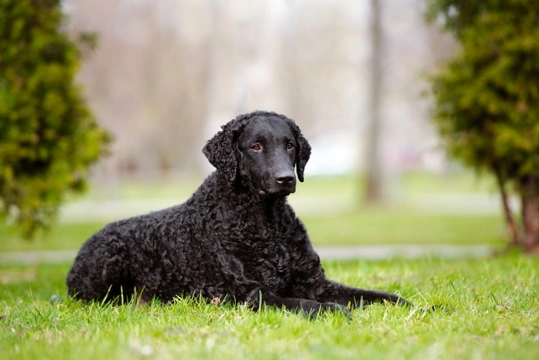
Glycogen storage disease (GSD IIIa) DNA Testing for the Curly Coated Retriever Dog Breed
Curly coated retrievers are one of the less common retrieving dog breeds in the UK, but they are also one of the oldest and longest established breeds of the retriever type. Originally bred and kept for working roles as retrieving dogs on both land and water, these outgoing, fun loving and very industrious dogs are a great fit for canine sport as well as working roles, and they make excellent pets for energetic, outdoorsy families too.
Curly coated retrievers are very intelligent dogs that need lots of exercise, which means that they tend to keep their owners on their toes and require a lot of time walking and playing to keep them happy. However, dogs of the breed are very playful and highly amenable to training that is fun, varied and engaging, which coupled with their high intelligence, makes them great to work with.
The breed as a whole is also notable for being very good with children, and they are a great choice for people with children that want to spend a lot of time with their dog.
The curly coated retriever breed is a very workmanlike one that is generally healthy and hardy, but as is the case with all pedigree breeds due to their limited genetic diversity, there are a number of hereditary health conditions that individual dogs of the breed can inherit from their parents. One of these conditions is called glycogen storage disease (GSDIIIa) and this is a type of glucose-mediated disorder that can cause a wide range of serious and acute symptoms in affected dogs, and which has a high mortality rate at a young age.
However, there is a DNA test available that identifies the gene mutation that causes glycogen storage disease in curly coated retrievers, which enables breeders to ensure that they only choose healthy parent stock for mating matches.
In this article we will explain how to get a curly coated retriever DNA tested for glycogen storage disease (GSDIIIa), as well as outlining how the condition is inherited, and how it affects dogs.
Read on to learn more about glycogen storage disease DNA testing for the curly coated retriever.
What is glycogen storage disease (GSDIIIa)?
Glycogen storage disease comes in a range of different variants, and the type that can be inherited by the curly coated retriever is designated a GSDIIIa, in order to make the distinction between the gene mutation and so, breed-specific variant found in curly coated retrievers rather than those found in other dogs.
Curly coated retrievers with glycogen storage disease inherit a genetic mutation that causes a deficiency in glucose-6-phosphate, which is a vital component that the body needs to produce glucose to support life.
This causes a complex and varied range of symptoms such as chronically low blood-sugar, and the accumulation of glycogen in the liver, which causes liver damage. Glycogen storage disease in curly coated retrievers is usually fatal to affected dogs at a young age.
How is glycogen storage disease inherited in the curly coated retriever?
The GSDIIIa variant of glycogen storage disease, the type that can be inherited by the curly coated retriever, is passed from dog to dog by means of autosomal recessive heredity.
This means that a pup or litter will only inherit glycogen storage disease is they inherit a combination of two gene faults for the condition, one from each side of their parentage. If you know the status of two parent dogs (or prospective parent dogs) you can work out what the odds are of their offspring inheriting the condition in their turn.
Here’s how glycogen storage disease (GSDIIIa) is inherited in the curly coated retriever:
- Two clear parent dogs will produce healthy, clear offspring.
- Two affected parent dogs will have affected offspring.
- Two carrier parent dogs will produce offspring with odds of 50% for being carriers in their turn, 25% of being clear, and 25% of being affected.
- A clear dog bred to a carrier will produce a litter with 50-50 chances of each pup being clear or carrier respectively.
- A clear dog bred to an affected dog will produce a litter of carriers.
- A carrier bred to an affected dog will produce a litter with 50-50 chances of each pup being a carrier or affected respectively.
How to get a curly coated retriever tested for glycogen storage disease (GSDIIIa)
If you are considering breeding from your curly coated retriever, you are strongly advised to get them tested for their status prior to going ahead. You also need to ensure that the other prospective parent dog is tested too, because you need to know the status of both dogs before you can determine the status of their offspring.
To get a curly coated retriever tested for glycogen storage disease (GSDIIIa) you just need to book a consult with your vet, let them know, and ask them to take a DNA sample from your dog.
The vet will then send the sample off to an approved laboratory in the UK who can carry out curly coated retriever glycogen storage disease tests, and who will return a result of the dog’s status to their owner.



